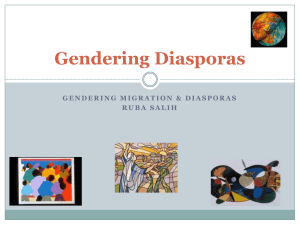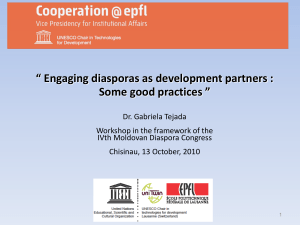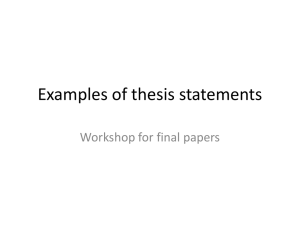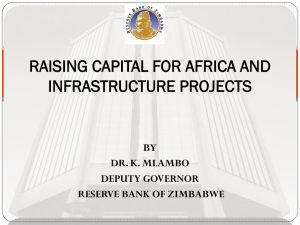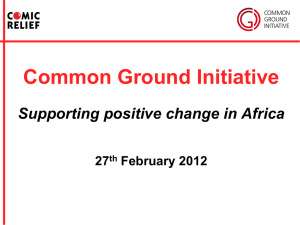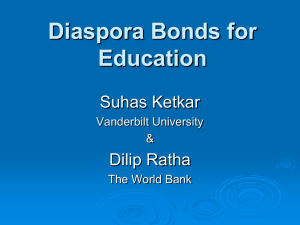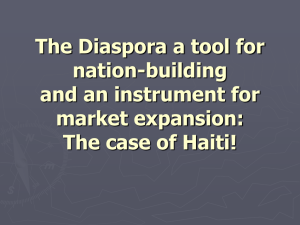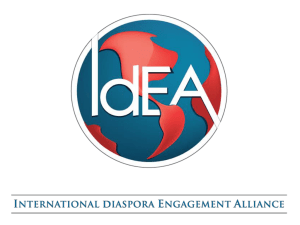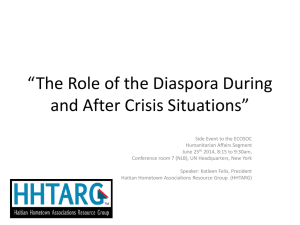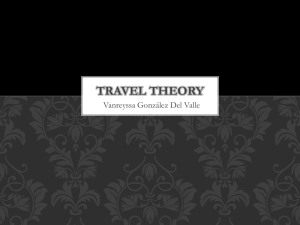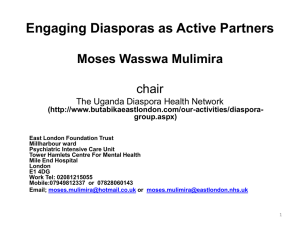A summary of discussions from the Human rights and Governance
advertisement
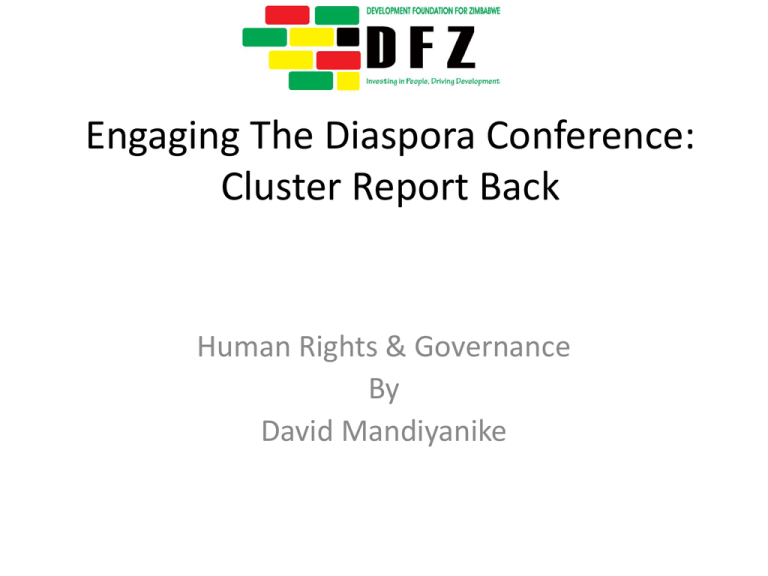
Engaging The Diaspora Conference: Cluster Report Back Human Rights & Governance By David Mandiyanike Outline • • • • • Constitution making Strengthening institutions Peace and reconciliation Elections Women in the Diaspora Significant Findings & Issues Discussed • • • • NEW CONSTITUTION Opportunities exist for diaspora to participate in the constitution making process (17 thematic areas and drafting) Challenges of COPAC process being politically driven GPA provided for a constitution before elections Constitution making now clouded by elections talk • DFZ to use all available means ie COPAC or via the respective political parties or civil society with the list of experts • Lack of political will to achieve Gender parity • (all-stakeholder conference resolution on 50/50) STRENGTHENING INSTITUTIONS – Parliament, Commissions - ZEC, Anti-corruption, Human Rights, Media and Civil Society • Identify people who have the expertise and interest • Of concern, no legislative framework to govern the operations of the Human Rights commission • Undermining of governance institutions by referring all key decisions to GPA principals • Knowledge management/institutional memory lacking. Peace and Reconciliation • The Diaspora can and should contribute to long term peace and reconciliation in Zimbabwe including through conversation on social and cultural diversity, political tolerance and national unity-through the media and public discourses, cultural days, and fora to address issues of national interest. • The Diaspora should strengthen and enhance the capacity of the Organ of National Healing to play a more robust role in early warning through facilitating technical exchange with other comparable experiences and best practices • Diaspora formations should share relevant and credible information on issues affecting Zimbabweans on their welfare, peace and security such as on migration (potential deportations) and xenophobia through online platforms (facebook, blogs, websites etc), media, churches and Diaspora networks. Peace and Reconciliation contd • The Diaspora should keep the momentum alive on the issue of dual citizenship and exercise of the right to vote through sustained campaigns and constructive engagement (for instance with parliamentary portfolio committees, drafters of the Constitution, and all actors across the political divide) based on neutral and objective language on a constitutional guarantee of dual citizenship. • DFZ should make a conscious effort to ensure inclusivity and cultivate strategic partnerships and synergies with civil society actors in Zim as well as sub- regional and regional civil society formations. WOMEN IN THE DIASPORA • Little is known about specific situation of women in the Diaspora and this needs to be specifically addressed. • Women in the diaspora • The DFZ will have a specific focus on women in its programming and work. Recommendations CONSTITUTION • DFZ to compile a database of all experts highlighting the areas of specialisation and interest. • DFZ to hold advocacy workshops highlighting issues of dual/multiple citizenship STRENGTHENING INSTITUTIONS • DFZ to approach the Parliament of Zimbabwe, oversight bodies and CSO to ascertain what type of assistance they would need to engage in robust activities • Assist MPs with expertise and other infrastructure eg pvt members’ bills, budget tracking etc • DFZ facilitate the knowledge production eg. policy briefs, policy dialogues • STRENGTHENING INSTITUTIONS recom conts • Lobby for the establishment of an international liaison office in Parliament to follow up on Zimbabwe’s international legal obligations • DFZ to proactively engage the state at both political and technical level Peace and Reconciliation Recommendations • Facilitate and/or commission a scoping study of the issues, existing initiatives and institutions working on peace and reconciliation in Zim and diaspora that clearly identifies specific and practical ways of the role of the Diaspora in fostering national healing and reconciliation in Zim • Facilitate development of an early warning mechanism for Zimbabwe through expert capacity enhancing such as technical exchange and share of best practices with comparable systems Peace and Reconciliation Recommendations • Undertake a scoping scan or collate and share with relevant policy makers the existing skills database among the Diaspora • Ensure inclusivity and cultivate strategic partnerships and synergies with civil society actors in Zimbabwe as well as sub- regional and regional civil society formations ELECTIONS • Collate and analyse best practices on the issue of dual citizenship and exercise of voting rights of all Zimbabweans • Lobby for and take part in early deployment of observers and election monitors with SADC, AU, the UN and international actors • Outline and engage all stakeholders on minimum and basic conditions for conducting genuine and credible free and fair elections Recommendations – Women in the Diaspora 1. A dedicated Women’s Desk within DFZ 2. Research: • Issues of women in the Diaspora • Initiatives by Women’s organisations & government in the Diaspora and Zimbabwe 3. The Diaspora to participate in informing policy & providing institutional support & capacity enhancement to policy makers – to prioritise women in the Diaspora Priority Areas Summary of Programmes Activities Actors/Partners Timelines Outputs Monitoring New Constitution •Identify experts to partake in the thematic areas •Compile database •Offer list of experts to help in drafting to COPAC, political parties & CSO •Advocacy on role of diaspora in Zim DFZ, ZDDI, GFZ, COPAC, PARLIAMENT Within the next 4 mths Database Database availability, Strengthening Institutions and security sector governance •Advocacy •DFZ to liase with indie commission on SWOT •DFZ to approach the Parliament of Zim, political parties in Parlia, assistance with pvt members bill DFZ, COPAC, Diaspora groups Within the next 12 months Training sessions, mentoring, Summary of Programmes contd Priority Areas Activities Actors/Partners Timelines Outputs Monitoring Women in the Diaspora •Set up a Women’s Desk/ Programme within DFZ (including fund raising) •DFZ (Women in the Diaspora Desk) •Within next 3 months •A women’s desk exists •Other Diaspora groups •Within next 3 months • A clear framework on engaging women in the Diaspora •Establish/ commission research projects on issues facing women in the Diaspora & initiatives within and outside the country on women’s issues •Women’s organisations in the Diaspora •Documentation of women in the Diaspora’s narratives •Women’s organisations in Zimbabwe •Data that can be used to inform policy and advocacy •Develop data base on capacities available within the Diaspora on women (and gender issues) •A research reports exists •Ministry of Women & Social Affairs •Organ on National Healing •SADC Gender Desk & other regional organisations •Within next 6 months •Database of expertise in the Diaspora on women’s issues •A database exists Summary of Programmes Priority Areas Activities Actors/Partners Timelines Outputs Peace and Commission reconcilia a scoping tion study of the issues, existing initiatives and institutions on Transitional Justice DFZ; Organ of National Healing; Relevant civil society actors in Zimbabwe; CSVR and IJR January 2010 Scoping study with specific recommend ations on the role of the Diaspora in national healing and reconciliatio n Facilitate developmen t of an early warning mechanism DFZ, organ of National healing, SADC, WANEP, March 2011 Innovative early warning system Monitoring
